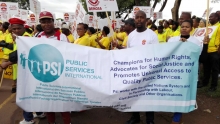DENOSA and NEHAWU Fight for Improved Health Services and Working Conditions in South Africa

In a letter of solidarity, the PSI General Secretary Rosa Pavanelli, saluted both unions:
“in taking the bold step of struggling for health employment and improving the South African health system”. The joint action by the two affiliates of PSI who had earlier scheduled separate actions for the day was an explicit expression of unity in action. And the PSI General Secretary called on them “not to relent in this struggle, till victory is won”.
DENOSA and NEHAWU’s commitment to fight this good fight was expressed in the plethora of demands made. In a Memorandum of Demands submitted to the department of health by protesting workers, the unions pointed out that “many facilities lack the most basic equipment”, due to underfunding of health services and questionable procurement procedures.
They thus demanded the:
“provision of basic equipment from credible and accredited service providers for workers to be able to render optimal care to the community” as well as “sufficient allocation in the health care budget so as to be able to fund equipment as required by health institutions”.
This was particularly significant as Mr. Pravin Gordhan the minister of finance presented the 2017 budget to parliament that same day. NEHAWU thus seized the moment to call on the government to drop its austerity measures on wage bill and personnel, and rather improve on conditions of service and better pay for workers. This was done in a memorandum handed over to Mr Gordhan by the union’s leadership, before he proceeded into the parliament.
DENOSA in its memorandum to the department of health stressed the importance of safe and effective staffing for improved health outcomes. The union insisted that
“staffing should be improved especially at the primary healthcare level so that it supports reengineering of PHC”. It further called for the strengthening of the Primary Health Care (PHC) system by making it accessible 24 hours of the day.
Noting the paradox of shortage of nursing and other health staff while there are “multitudes of qualified staff nurses and assistant nurses seeking jobs”, it called for the filling of all vacancies in the health system and enhanced health employment. This is critical for achieving universal access to health care in South Africa.
Transforming nursing education has to go hand in hand with enhanced health employment. This is why DENOSA equally observed the need for concerted efforts by the South African ministries of health and education to address the challenge of implementing the new curriculum for nursing schools with quality assurance by universities which nursing colleges are affiliated to.
The indignation of DENOSA on professional issues of concern to nurses was clearly expressed even more, when the protesters marched on the South African Nursing Council (SANC), which was the last stop of the procession. Oscar Phak, the union’s General Secretary read out the worker’ demands to the SANC as he presented the Memorandum of Demand to the SANC board chairperson, Professor Bhengu and its Acting Registrar, Sizo Mchunu.
DENOSA called for an end to interference in the SANC procedures by the department of health and decried the lack of transparency in how licensing and other fees for nurses are arbitrarily increased, and spent. The way and manner nurses’ names are struck off the roll or that nurses get suspended for prolonged lengths of time for the slightest of reasons, the union pointed out, is bad for morale.
Speaking before the workers left the SANC headquarters, DENOSA President, Simon Hlungwani made it clear that SANC had seven days to respond to the union’s demands or workers would come and occupy the Council’s office.
Read PSI's full letter of support via the attachment below:

